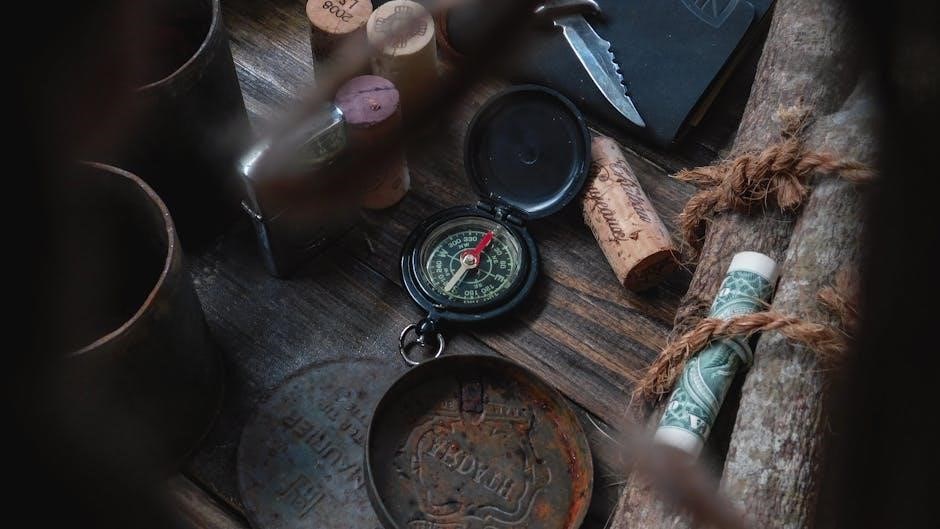Understanding the Basics of Blacksmithing
Blacksmithing in EverQuest is a trade skill allowing players to craft metal items like weapons and armor. It requires understanding metals, materials, and tools. Trainers in major cities teach the basics, while resources and recipes guide progression. This skill is central to the game’s economy, enabling crafting for personal use or trade.
What is Blacksmithing in EverQuest?
Blacksmithing in EverQuest is a trade skill that enables players to craft metal items, such as weapons, armor, and components for other trades. It is a vital skill for equipping characters and supporting various crafting disciplines. Players must use a forge and specific materials like ores and molds to create items. As the skill level increases, more complex recipes become available, allowing for the creation of higher-quality gear. Blacksmithing is essential for both personal use and contributing to the game’s economy. With practice and successful crafting, players can master this skill, unlocking advanced recipes and enhancing their in-game capabilities.
Types of Metals and Materials
In EverQuest, blacksmithing utilizes various metals and materials to craft items. Common metals include iron, steel, and high-grade ores, which are used for weapons and armor. Steel, in particular, is essential for early crafting, while rarer metals like mithril and velium are reserved for advanced recipes. Materials such as water flasks, molds, and files are also crucial for crafting. Players can obtain ores by mining or purchasing from vendors, while other components like leather padding require specific drops. The quality and rarity of metals and materials determine the outcome of crafted items, making resource management a key aspect of blacksmithing success.
Role of Blacksmithing in the Game Economy
Blacksmithing plays a vital role in EverQuest’s economy by producing essential items for players. Crafted goods like weapons, armor, and tools are in high demand, making blacksmiths key suppliers. Players rely on blacksmiths for equipment upgrades and repair, creating a steady market. Additionally, blacksmithing supports other tradeskills by providing components such as steel boning for tailoring. This interconnectedness increases the value of blacksmithing, making it a profitable skill. By crafting items for personal use or sale, blacksmiths contribute significantly to the game’s economy, fostering trade and player interaction. The ability to create rare or high-demand items further enhances the skill’s economic impact and desirability.
EQ Blacksmithing Leveling Guide
Mastering blacksmithing in EverQuest requires a structured approach. Start by training with a tradeskill master to build foundational skills. Progress through crafting steel boning, large lanterns, and banded armor to enhance efficiency. Utilize vendor-bought materials and farmed resources strategically to optimize skill gain. As you advance, focus on creating high-demand items like fine plate armor and planar metal sheets for endgame progression. Balancing cost and effort ensures steady growth, making blacksmithing a rewarding and integral part of your gameplay experience.
Levels 1-21: Training and Foundations
Begin your blacksmithing journey by training with a tradeskill master in any major city. This initial phase is straightforward and cost-effective, focusing on building foundational skills. Invest in skill points until you reach level 21, which provides a solid base for further progression. During this stage, you’ll work with basic materials like metal bits and water flasks, crafting simple items to refine your technique. This period is essential for understanding the mechanics of blacksmithing and preparing for more complex recipes. Keep in mind that these early levels lay the groundwork for crafting advanced gear and components later in the game.
Levels 21-37: Steel Boning and Early Progression
Once you reach level 21, focus on crafting Steel Boning, a crucial component for tailoring and other tradeskills. This phase introduces slightly more complex recipes but remains manageable with vendor-bought materials like steel ingots and water flasks. Steel Boning becomes trivial at level 37, making it an efficient way to gain skill points. During this stage, you’ll refine your understanding of metalworking and resource management. Keep an eye on material costs and consider farming or purchasing materials in bulk to optimize your progress. This phase is a stepping stone to more advanced crafting, so ensure you master Steel Boning before moving forward.
Levels 37-68: Large Lanterns and Intermediate Crafting
At level 37, shift focus to crafting Large Lanterns, which serve as a key intermediate step. This recipe requires iron ingots, water flasks, and lantern molds, all easily sourced from vendors. Large Lanterns become trivial at level 58, providing steady skill gains until then. This phase introduces more complex crafting, helping you refine your blacksmithing skills. It’s essential to manage resources efficiently, as material costs rise. Farming materials or buying in bulk can reduce expenses. Large Lanterns are a reliable way to progress, but be prepared to switch recipes once they trivialize to avoid wasting resources. This phase lays the groundwork for more advanced crafting techniques later on.
Levels 68-122: Banded Armor and Advanced Techniques
Reaching level 68 unlocks Banded Armor, a cornerstone of advanced blacksmithing. This recipe uses iron and steel ingots, along with other vendor-bought materials, making it accessible yet resource-intensive. Banded Armor becomes trivial at level 122, making it an excellent skill-up method for this range. During this phase, you’ll also begin crafting Fine Plate Armor, which requires rare materials like spiderling silks and LQ pelts. These high-end items are essential for both personal gear and crafting for others. As you progress, you’ll also start working with planar metals, enabling the creation of advanced gear and components. This phase is critical for mastering the intricacies of high-level blacksmithing, preparing you for endgame crafting and trade.

Advanced Blacksmithing Techniques
Advanced blacksmithing involves crafting complex items like Fine Plate Armor and planar metal sheets. These techniques require rare materials and precise crafting patterns, enhancing endgame gear.
Crafting Fine Plate Armor and High-Level Gear
Crafting Fine Plate Armor in EverQuest requires advanced blacksmithing skills and rare materials. This process involves combining spiderling silks, LQ pelts, and high-quality metals. Players must reach a skill level of 188 to craft these items effectively. Fine Plate Armor is highly sought after for its superior protection and durability, making it a valuable asset for high-level characters. The challenge lies in obtaining the necessary materials, as spiderling silks and LQ pelts are difficult to farm. Crafting Fine Plate Armor also requires specific recipes and patterns, which can be learned through extensive practice and experimentation. This advanced technique is a testament to a blacksmith’s mastery of their craft, enabling the creation of endgame gear that stands out in both performance and appearance.

Planar Metal Sheets and Endgame Crafting
Planar Metal Sheets are a cornerstone of high-level blacksmithing in EverQuest, enabling the crafting of powerful endgame gear. These sheets require rare materials like Velium and Planar metals, which drop in challenging zones. Crafting them demands a high skill level and access to a Planar Forge, introduced in the Luclin expansion. Planar Metal Sheets are essential for creating top-tier armor and weapons, making them highly sought after by players. The process is complex, but the rewards are substantial, as Planar gear remains some of the best in the game. Mastering this technique marks the pinnacle of a blacksmith’s journey, offering unparalleled crafting capabilities.

Recipes and Materials
Essential materials like metals, molds, and water flasks are vital for crafting. Recipes often require precise components, which can be vendor-bought or farmed, ensuring crafting success.
Key Recipes for Blacksmithing Success
Mastering essential recipes is crucial for advancing in blacksmithing. Steel Boning, a fundamental component used in tailoring, requires steel ingots and water. Large Lanterns, made from iron and oil, boost skill levels efficiently. Fine Plate Armor demands rare materials like spiderling silks and pelts, offering high returns. Planar Metal Sheets, crafted with shadowscream, are vital for endgame gear. Each recipe has specific trivial levels, ensuring skill progression. Using vendor-bought materials like molds and files streamlines crafting, while farming rare components can enhance productivity. Balancing these recipes optimizes skill gain and resource management, essential for achieving mastery in blacksmithing.
Essential Materials and Their Sources
Blacksmithing relies on various materials, with metals being the most critical. Iron and steel ingots are foundational, obtainable from vendors or by smelting ores. Rare metals like shadowscream and thalium are essential for high-level crafting, often requiring specific zones or events. Leather padding, spiderling silks, and LQ pelts are key for fine plate armor, typically farmed in zones like East Karana. Molds and files are vendor-purchased, while water flasks are basic but necessary. Large bricks, crafted from small bricks and water, are used in lanterns. Understanding where and how to acquire these materials efficiently is vital for optimizing crafting and skill progression in blacksmithing.

Tips for Maximizing Blacksmithing Progress
Optimize skill gain by using vendor-bought materials for early levels and farmed resources for higher-tier items. Craft in bulk and sell excess for platinum to fund progression.
Optimizing Skill Gain and Resource Management
To efficiently level your blacksmithing skill, focus on combining vendor-bought materials for early progression. This method ensures steady skill gains without significant resource investment. As you advance, incorporate farmed materials like ores and pelts for higher-tier recipes. Prioritize crafting items with high demand, such as steel boning and banded armor, to maximize profit and skill efficiency. Additionally, consider crafting in bulk and selling excess items to generate platinum, which can be reinvested into rarer materials for advanced recipes. Balancing cost-effective practices with strategic resource allocation is key to mastering blacksmithing in EverQuest.

Leave a Reply
You must be logged in to post a comment.